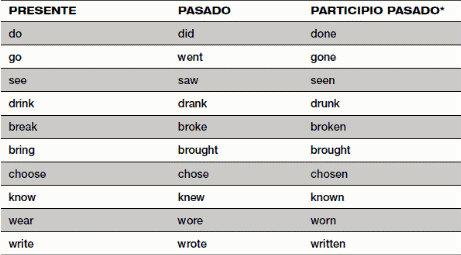Pasado participio
El pasado participio es la forma del verbo que, en español tiene las terminaciones "ado" ó "ido". Siempre se usa con un verbo auxiliar. El pasado participio de los verbos regulares en inglés se forma igual que el pasado del inglés agregando __ed ó __d al final del verbo.
Forma básica / Participio en inglés / Significado
walk / walked
caminar | caminado
caminar | caminado
jump / jumped
caminar | caminado
caminar | caminado
live / lived
vivir | vivido
vivir | vivido
play / played
jugar | jugado
jugar | jugado
study / studied
estudiar | estudiado
estudiar | estudiado
Los verbos que terminan con consonante antes de la "y", se cambia la letra "y" por "i", y se agrega la terminación "ed".
supply / supplied
abastecer | abastecido
abastecer | abastecido
try / tried
intentar | intentado
intentar | intentado
Los verbos que terminan con vocal antes de la "y", simplemente agregamos la terminación "ed" sin ningún otro cambio.
employ / employed
emplear | empleado
emplear | empleado
Los verbos irregulares tienen diversas terminaciones, ve a la sección de verbos irregulares para ver una lista de ellos.
imagen de pasado participio
video de pasado participio
Ejercicios de pasado participio
Escribe los participios de los verbos siguientes.
| Present participle | Past participle | Perfect participle | |
|---|---|---|---|
| work | |||
| go | |||
| come |
Elige la forma correcta (present participle or past participle).
Escribe el verbo en la forma correcta (Present Participle, Past Participle o Perfect Participle).
Pasado simple
Para formar el pasado simple con verbos regulares, usamos el infinitivo y añadimos la terminación “-ed”. La forma es la misma para todas las personas (I, you, he, she, it, we, they).
Ejemplos:
| want → wanted |
| learn → learned |
| stay → stayed |
| walk → walked |
show → showedImagen de pasado simple |
video de pasado simple
ejercicio de pasado simple |
should
should. Es muy importante dominarlo, ya que es una de las palabras que más oirás y utilizarás en inglés.
Should se utiliza para recomendar hacer algo y para afirmar si nos parece que algo es como debería ser o no.
La teoría
Como todos los verbos modales, should va acompañado del infinitivo del verbo principal sin to.
- You should get some more sleep.
- The world should be.
Para formar la negación se añade not después de should y, al contrario que en el caso de might, casi siempre se contrae en la forma negativa.
Te recordamos que los verbos modales no toman la s en la 3ª persona del singular ni adoptan una forma diferente en tiempos pasados ni se combinan con el auxiliar do en preguntas o negaciones.
La práctica
Pronuncia /shhhuud/ en las siguientes frases.
Deberías hacer algo respecto a tu pelo, cariño.
|
You should do something about your hair, darling.
|
En mi opinión, deberías ocuparte de ello ahora mismo.
|
I think you should see to it right now.
|
Todo el mundo debería tener un sitio donde vivir.
|
Everyone should have a place to live.
|
En estos ejemplos verás /shhhuudnt/, el sonido de la negación contraída.
No deberías preocuparte tanto sobre lo que piensa la gente.
|
You shouldn’t worry so much about what people think.
|
No debería ver películas de miedo; me dan pesadillas.
|
I shouldn’t watch horror films; they give me nightmares.
|
Encontrar un trabajo decente no debería ser una misión imposible.
|
Finding a decent job shouldn’t have to be mission impossible.
|
Fíjate en como empieza la primera pregunta: /shhhúdai/.
¿Debería quedarme o irme?
|
Should I stay or should I go?
|
¿No debería (él) ir al médico?
|
Shouldn’t he see a doctor?
|
¿Crees que debería sincerarme?
|
Do you think I should come clean?
|
Imagen de should

Video de should
Ejercicio de should
Should I or should not I? -
Free English exercise for ESL / EFL students. ... Other English exercises on the same subject: Manners [Change topic] ... Double-click on the words you do not understand ...
2 Should / should not: English
Should / should not: free exercise for ESL / EFL students.
3Debes / debe - English
You must not be late. (Your ne dois pas être en retard). Exercise: choose the correct answer: should, should not, should, should not. English exercise "Should / must" ...
4You should / should / should not / should not - English
Should / should / should not / not: free exercise for ESL / EFL students.
5Can / Must / Should - English
Can / Must / Must: free exercise for ESL / EFL students. ... Modal verbs - Modal verbs - Could / Could not - Manners. > Double click on the words you do not understand ...
6 You should - English
You should. He. She + infinitive. That. We should not Them. They coincide with the beginning and end of sentences. English exercise "Should" created by chrislondon with ...
7Must / Have to - English
Must / Have to: free exercise for ESL / EFL students. ... but it can not be used to talk about the past (it is used to do it). ----Interrogative form. You have to go
8 Should I have or should I have? - English
Click here! Recommended:> English translator> Our other sites · Learn English> English lessons and exercises> English test # 16638: Should or should have ...

Comentarios
Publicar un comentario